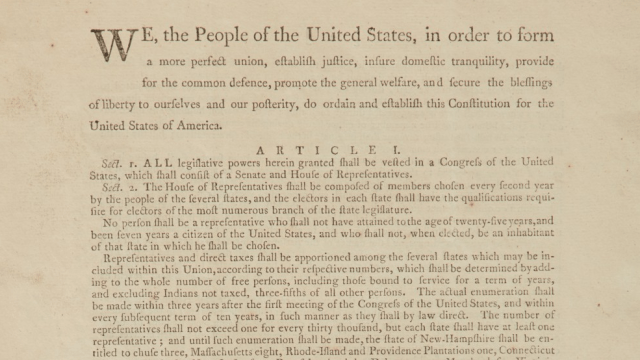Last week, ConstitutionDAO, the DAO that crowdsourced over $US47 (A$65) million to buy a copy of the Constitution, suffered a poetically tragic loss to billionaire Citadel CEO Ken Griffin. They’d inspired meme investors and blockchain idealists and fell to the guy accused of wiping out Robinhood users’ Gamestop gains, universally loathed by meme investors. Now left with no Constitution and a mountain of funds in a multisig wallet, ConstitutionDAO is staring down the unenviable task of potentially processing over 17,000 refunds. And it has a (vague) plan (sort of).
Responding to the masses on Saturday, the group tweeted that donors — many of them evidently new to ether — can, as promised, refund their governance tokens (PEOPLE) for their original value in ether, minus gas fees. Their next move may ultimately reveal whether this was as altruistic as over 17,000 donors hoped, with their median investments of around $US200 (A$276).
No news there, but here’s the twist: ConstitutionDAO is launching a new governance token We the People (WTP), which donors can choose to receive instead, proportional to the current value of their PEOPLE tokens. Why compound the headache by launching a second token? That’s the $US40 (A$55) million+ question. ConstitutionDAO doesn’t offer many answers, so we’ll have to speculate.
Money could be a reason for the new token, perhaps. PEOPLE tokens represent no monetary value to donors; they simply represent voting power to decide what to do with whatever assets the DAO collects. (In the case of the Constitution, that would have been institutional care and crafting the DAO’s mission.) Donors do not receive fractional ownership of items acquired by the DAO, and they aren’t expected to cash in on any of the gains from the increased value in PEOPLE tokens. They only get refunds for what they donated, minus gas fees.
ConstitutionDAO retains whatever funds donors choose not to demand back. Presumably, those funds will increase over time with the value of ether. The value of PEOPLE has risen in recent days because more people purchased (or received) PEOPLE in exchange for their donations.
If enough people move their ether to WTP tokens, the value of WTP tokens presumably rises. Subsequent buyers have to pay more to get their vote (or governance token).
Who makes money from the increased value of WTP tokens?
One candidate is Juicebox, another recently-launched DAO which processes payments for tokens for other DAOs, including ConstitutionDAO. After some in-fighting over who should process the refunds, ConstitutionDAO settled on Juicebox. As David Gerard has pointed out, Juicebox founder “Jango” is also one of the signers of ConstitutionDAO’s multisig wallet, which ConstitutionDAO didn’t disclose during fundraising. Juicebox typically collects 5% of “all money made by projects,” though a co-founder finally tweeted recently that Juicebox had waived the fees for ConstitutionDAO’s last project. (Are tweets about your cryptocurrency project legally binding? ¯_(ツ)_/¯)
If Juicebox does not waive fees for WTP-funded ventures, then this may have been exactly what it looked like in the first place: a wildly successful marketing campaign to juice a crypto group in its infancy.
We don’t know whether they will, thanks to ConstitutionDAO’s general caginess when asked for details. That started even with what the ownership structure would look like if they bought the Constitution — in response to Gizmodo’s requests before last week’s auction, one of the multisig wallet co-signers simply said that “after the initial purchase, the community will be able to restructure ownership to best reflect the mission and values of the DAO.” When asked follow-up questions several times through various channels, the DAO went silent.
